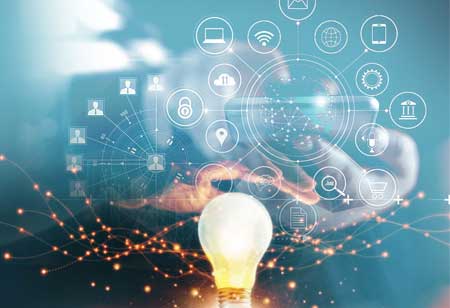THANK YOU FOR SUBSCRIBING
Trends Driving the Evolution of Smart Cities
The future of smart cities involves integrating 5G, AI, and renewable energy, enhancing transportation, governance, and community engagement

By
Apac CIOOutlook | Tuesday, December 24, 2024
Stay ahead of the industry with exclusive feature stories on the top companies, expert insights and the latest news delivered straight to your inbox. Subscribe today.
The future of smart cities involves integrating 5G, AI, and renewable energy, enhancing transportation, governance, and community engagement while focusing on sustainability and digital inclusion.
FREMONT, CA: The future of smart cities promises a transformative leap forward as technology continues to advance and reshape urban living. These developments will enhance infrastructure, streamline services and improve transportation, governance, and community engagement. This forward-looking vision aims to create urban environments that are technologically advanced, resilient, and inclusive, setting a new standard for the cities of tomorrow.
5G Connectivity and IoT Expansion
The rollout of 5G networks is set to accelerate the adoption of the Internet of Things (IoT) in smart cities. With ultra-fast and low-latency connections, 5G technology enables real-time data transmission, making it ideal for many IoT applications. This advancement is expected to lead to a proliferation of smart sensors and devices that monitor various urban metrics, such as traffic flow and air quality. These innovations will enhance data-driven decision-making for city planners, contributing to more efficient and responsive urban environments.
AI-Driven Urban Planning
Artificial Intelligence (AI) is increasingly being utilized to analyze the vast amounts of data smart city sensors collect. AI will be crucial in optimizing urban planning, traffic management, and resource allocation. By processing and interpreting data more effectively, AI will help create more efficient and sustainable city designs, facilitating improvements in infrastructure and services that better meet the needs of growing urban populations.
Sustainable Transportation Solutions
As concerns about urban congestion and environmental impact grow, smart cities prioritize sustainable transportation solutions. The rise of electric vehicles, bike-sharing programs, and enhanced public transit systems will become more prevalent. Additionally, Mobility as a Service (MaaS) platforms will integrate various transportation modes into a seamless and eco-friendly commuter experience, promoting greener and more efficient urban mobility.
Renewable Energy Integration
Smart cities are increasingly turning to renewable energy sources to reduce carbon footprints and enhance energy resilience. Solar panels, wind turbines, and advanced energy storage solutions will be integrated into the urban landscape. This shift towards renewable energy will support the development of more sustainable cities by providing cleaner power and reducing reliance on fossil fuels.
Blockchain for Governance and Security
Blockchain technology is gaining traction in smart cities for its potential to enhance security and transparency. It offers applications such as secure identity verification, secure voting systems, and tamper-proof record-keeping. These capabilities contribute to better governance and data protection, ensuring smart city initiatives are safe and transparent.
Augmented Reality (AR) for Urban Design
AR technology is being leveraged to visualize urban development projects before they are realized. AR facilitates better-informed decision-making and promotes greater community engagement in urban development by allowing city planners and residents to explore proposed changes in real time. This technology helps stakeholders understand and interact more effectively with proposed modifications to the cityscape.
Community-Centric Data Initiatives
Smart cities increasingly recognize the importance of involving residents in data collection and decision-making processes. Community-centric data initiatives, such as participatory budgeting and crowdsourced urban planning, will become more prevalent. These efforts ensure that smart city projects are aligned with the community's needs and preferences, fostering a more inclusive and responsive urban environment.
Resilience and Disaster Preparedness
In response to the increasing frequency of extreme weather events, smart cities invest in resilient infrastructure and disaster preparedness. This includes implementing early warning systems, constructing flood-resistant buildings, and developing evacuation plans powered by real-time data and predictive analytics. These measures aim to enhance the city's ability to withstand and recover from disasters, ensuring greater safety and resilience for residents.
Digital Inclusion and Equity
Efforts will focus on ensuring that all residents, regardless of socioeconomic status, have access to digital services and opportunities for participation in the smart city ecosystem. By promoting digital inclusion and equity, smart cities aim to create a more accessible and fair urban environment for everyone.
Circular Economy Practices
Smart cities are promoting circular economy principles to promote sustainability and reduce waste. Initiatives such as recycling programs, waste-to-energy projects, and promoting eco-friendly products and practices will be at the forefront of urban sustainability efforts. These practices are designed to create a more sustainable urban environment by minimizing waste and maximizing resource efficiency.
As cities embrace 5G, AI, and renewable energy, they will enhance efficiency, improve quality of life, and address environmental challenges. The evolution of smart cities will promote more connected, resilient, and inclusive communities, ensuring that technological progress benefits all residents. By prioritizing innovation and sustainability, smart cities will pave the way for a more effective and equitable urban future, setting new benchmarks for how cities adapt to the needs of their inhabitants while contributing to global sustainability goals.





